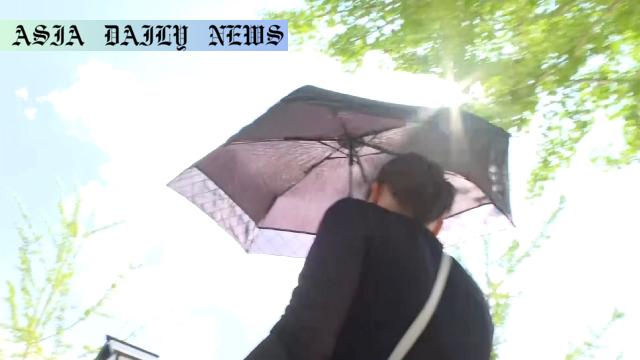Heatstroke grips Japan as 100 people are hospitalized in Tokyo and a 90-year-old man dies in Gifu amidst a daunting heatwave.
Heatstroke claims the life of a 90-year-old man found in Gifu.
100 people in Tokyo hospitalized on Thursday due to heat-related symptoms.
Authorities urge caution as victims span a wide age range, from 11 to 97.
Two other heatstroke deaths reported in Tokyo this month lacked air conditioning use.

Heatwave Hits Japan: A Deadly Toll
The recent heatwave enveloping Japan has taken a tragic turn, with officials confirming heatstroke-related incidents on the rise. In the central prefecture of Gifu, a 90-year-old man was discovered unconscious in a field on Thursday afternoon. Despite being rushed to a nearby hospital for urgent medical attention, he was later pronounced dead. This incident underscores the critical dangers posed by extreme heat, especially for vulnerable populations such as the elderly.
The severity of the heatwave isn’t limited to one region. As of 9 p.m. on the same day, the Tokyo Fire Department reported that 100 people, ranging from ages 11 to 97, were hospitalized due to suspected heatstroke. Among them, one individual is in critical condition, while two others are in serious condition. The wide age range of the victims highlights that heatstroke can affect anyone, regardless of age or activity, thus stressing the importance of taking preventive measures during extreme climates.
Impact Beyond Immediate Reports: Previous Deaths Due to Heat
This heatwave doesn’t mark the first fatal encounters for the season. Tokyo’s Metropolitan Medical Examiner’s Office revealed that two individuals in their 70s died earlier this month, likely from heatstroke. It was noted that neither victim had air conditioning in use during the time of their deaths. This raises significant concerns about the accessibility and usage of necessary cooling infrastructure during increasingly hotter summers in Japan.
Authorities warn residents to take precautionary measures, including staying hydrated, avoiding direct sunlight during peak hours, and utilizing air conditioning or fans to maintain safe home environments. Public messaging has also emphasized the importance of regularly checking on elderly neighbors or those who might lack access to modern amenities.
Broader Implications and Rising Temperatures
Japan’s current plight with heatstroke-related tragedies paints a vivid picture of the escalating consequences of global climate change. The frequency and intensity of heatwaves have increased considerably in recent decades, pushing the limits of urban infrastructure and public health networks. Older cities like Tokyo particularly face challenges adapting their systems to withstand extreme weather conditions. As temperatures climb higher during summers, overheating environments could turn from an occasional occurrence to a seasonal crisis unless action is taken.
Government officials and climate experts alike have stressed the urgency of preparing for such eventualities, with proposed measures including expanded access to cooling shelters, widespread educational campaigns about heat safety, and incentives for upgrading households with energy-efficient air conditioners. While immediate relief and protection policies are always welcomed, addressing the root cause of climate change globally remains the ultimate solution to stem such recurring crises.
Lessons Learned for the Future
The tragic stories unfolding in Japan serve as a poignant reminder of the vulnerability of human life in the face of extreme natural forces. Communities have a responsibility to implement practical safeguards, and nations should work together internationally to mitigate adverse environmental changes. Cities like Tokyo must address both infrastructural and social gaps that leave certain age groups—especially the elderly—disproportionately affected by these events.
By turning these heatwave-related incidents into a clarion call for proactive planning and climate action, communities worldwide can work towards a future where such fatalities become rarer. A dual approach focusing on immediate community-level interventions and overarching climate-focused reform offers the best solution to safeguard people’s lives and well-being.
Commentary
The Growing Risk of Heatwaves
Heatstroke-related fatalities and hospitalizations, as seen in Japan recently, highlight a sobering reality: the planet’s changing climate is no longer a distant threat but a present danger. The death of a 90-year-old man in Gifu and the hospitalization of 100 individuals in Tokyo are poignant reminders of how ill-prepared we can be for weather extremes. These events also underscore the profound effects of rising global temperatures on vulnerable populations, particularly the elderly and those lacking access to adequate cooling systems.
Where Public Awareness Meets Responsibility
Society must prioritize and spread greater awareness about the practical steps that can help individuals combat extreme heat. While official advisories and emergency-response systems are vital, it is equally essential for these efforts to bridge societal gaps by addressing systemic inequalities. For instance, the fact that two Tokyo residents in their 70s died due to the lack of air conditioning raises questions about equity in access to essential utilities that safeguard health in extreme weather conditions. More robust systems supporting at-risk individuals, such as community outreach programs for elderly residents, must become part of a larger action plan moving forward.
A Call for Global Climate Action
Beyond immediate responses, it is impossible to ignore the broader lessons this tragedy serves for long-term climate adaptation and action. Governments worldwide need to work collaboratively and imagine solutions addressing both public health crises and environmental sustainability. By balancing policies that protect the planet with measures to directly assist vulnerable communities, we create the foundations for a safer, more resilient future. Japan’s experience could serve as a global case study, motivating policymakers and everyday citizens to act before similar situations spiral out of control in other parts of the world.
Ultimately, events like these remind us of the intricate interconnection between environmental concerns and human lives. While Japan mourns its losses and takes steps to recover, the importance of action to counter climate-induced dangers is clear. In moments like these, every effort counts, no matter how big or small.


